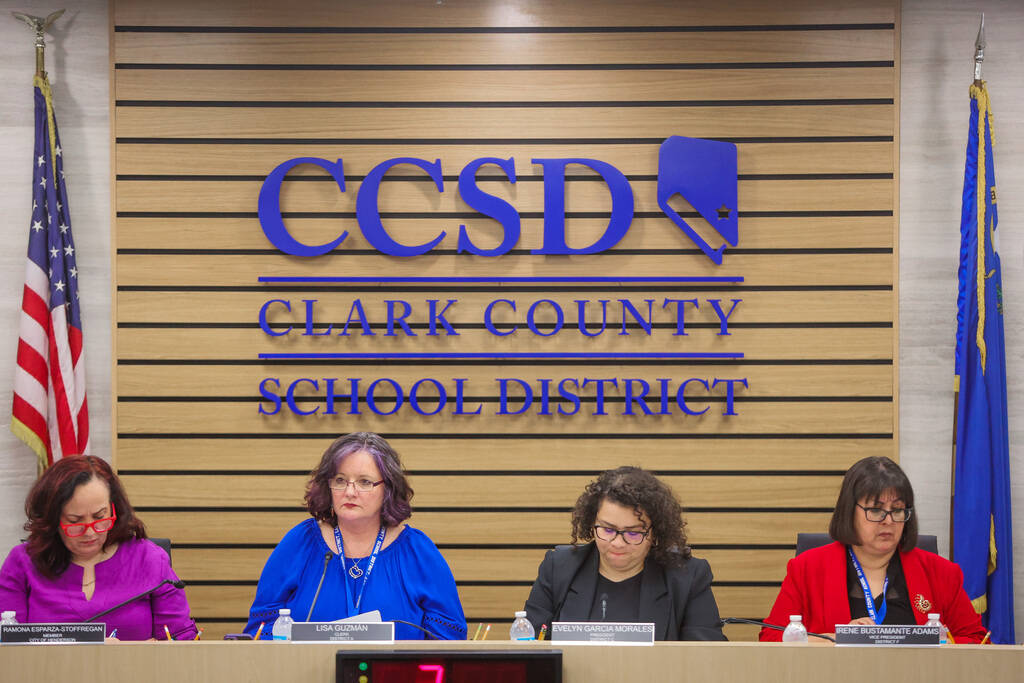‘Where’s the money?’: CCSD’s budget deficit raises questions again at meeting
The Clark County School District’s potential $10 million central budget deficit may sound like a small percentage of its nearly $4 billion budget. So why are schools across the district cutting staff, programming and supplies, and finding themselves with hundreds of thousands of dollars — and in some cases over a million dollars — less than they were told they would have last spring?
The impacts the schools are facing are due to miscalculations in the January 2024 budget, and are unrelated to the district’s potential central deficit — though, as Clark County Education Association Executive Director John Vellardita told the Las Vegas Review-Journal on Wednesday, the two issues, when put together, paint a picture of what he said is CCSD’s financial mismanagement.
For the second meeting in a row, the budget was on the agenda for the Clark County School Board’s Thursday meeting. Interim Superintendent Brenda Larsen-Mitchell, Interim Chief Financial Officer Dianne Bartholomew and Chief Strategy Officer Kellie Kowal-Paul fielded questions from trustees about how the district ended up in this position, and what it would change going forward.
The district has blamed its central budget deficit on $53 million in litigation and $15 million in cybersecurity costs. But the error that has impacted schools came last January, when the projected budget failed to include the eight percent raises it had agreed to in December with CCEA, and used the incorrect formula for at-risk funding, the district has said.
CCSD under projected the average cost of a licensed educator by $5,700, which, when multiplied for the 16,500 educators it budgeted for, meant almost $100 million spread across schools. That means that when the issue was corrected in the fall, schools found themselves with higher costs for teachers for whom they had been given incorrect budgeting information.
Another error in January’s budget was the at-risk funding calculation. CCSD had calculated the amount of money schools would get for at-risk students based on the formula for free and reduced lunch calculation as opposed to the GRAD score. The newer formula, introduced last year, reduced the amount of students eligible for at-risk funding across the district by 3,035 students, which meant that across the district, schools received $928,747 less than expected, according to documents provided by CCSD.
Schools make cuts
As a result of these errors, 36 licensed professionals, 41 support professionals and five administrators have been surplussed, Chief of Human Resources RoAnn Triana said at Thursday’s board meeting.
At CCSD, to be surplussed means to be reassigned, which can sometimes mean a move to an unwanted or lower paying position.
Three support professionals resigned amidst the surplussing, according to Triana. Fourteen selected “no position,” which will cause “bumping” down to other positions, meaning four people who were hired in September and October will lose their positions entirely, Triana said.
CCSD at least partially approved the requests for additional funding from 31 schools, and rejected one school’s request, saying it was not considered to have significant challenges, according to a Monday letter from Larsen-Mitchell to Nevada Superintendent of Public Instruction Jhone Ebert.
When asked at Thursday’s meeting what it meant not to have significant challenges, Deputy Superintendent Melissa Gutierrez answered that the school did not have to cut staff.
‘Such an important impact to our community’
Trustees have shown differing degrees of concern over the budget situation, both on Thursday and in the Oct. 10 meeting, when it was first on the agenda.
Trustee Lola Brooks and Trustee President Evelyn Garcia Morales have generally defended the administrators, with Garcia Morales commending their “bravery” for speaking in front of the board, and Brooks saying they were “catching a lot of heat.”
Other trustees mentioned the confusion among many of their constituents, and the ways the errors had hurt the schools.
“This is such an important impact to our community,” Trustee Ramona Esparza Stoffregan said.
Trustee Isaac Barron questioned why there was no corresponding reference material with the budget update, nor any numbers.
Rolling budget
Barron also questioned how the money in the central deficit kept decreasing. It was originally estimated at $20 million, then reduced to $12 million and then $10.9 million. At Thursday’s meeting, administrators said it was “approximately $10 million.”
“Where’s the money?” he asked.
Bartholomew said that the changing number was due to the fact that they were still in the process of closing out the books.
Kowal-Paul also said the district had found ways to use outside grant money, such as ESSER, which had not been used in its entirety.
The district said it plans to offset the deficit from its unassigned balance, or reserve fund, which it said it can still keep at above four percent, which is the state’s recommendation.
It plans to present its amended budget in a Dec. 12 board meeting.
Contact Katie Futterman at kfutterman@reviewjournal.com.






















